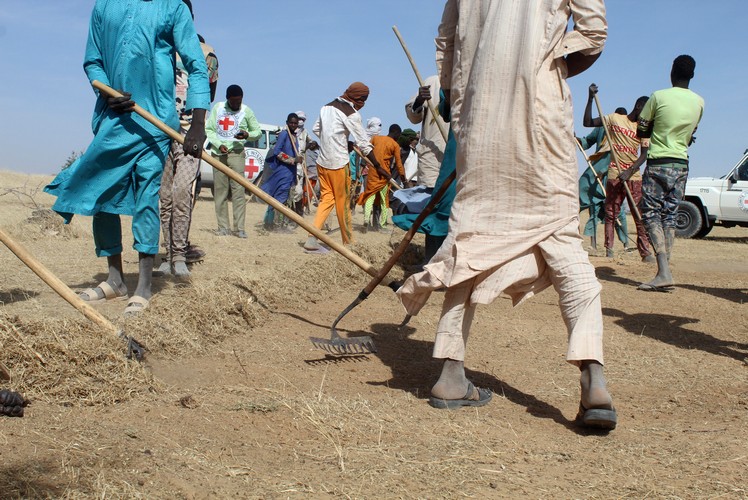Tensions between farmers and herders in the Sahel, as elsewhere, are as old as time itself. Yet they are hotting up in countries like Niger, owing to the cumulative effects of armed conflict, climate change, rampant population growth and competition for natural resources.
Unless more is done to address the issue, the threat of intercommunity violence is likely to rise.
“The collective impact of all these factors is generating huge pressures on natural resources such as farmland, water and grazing, with affected communities facing severe economic and food insecurity,” says François Moreillon, head of the ICRC delegation in Niger.
“This in turn is increasing tensions and the risk of violence among communities who need to share natural resources.”
Niger’s population of 25 million is the fastest growing in the world, doubling almost every 20 years. There is large-scale displacement and insecurity from protracted conflicts in the eastern Lake Chad area and the Sahel region. Plus, it is one of the countries most affected by the climate crisis.
Over the past 50 years, Niger has lost half its surface water, while desertification is devouring 120,000 hectares of fertile land a year. That’s equivalent to roughly 160,000 football pitches.
All this in a country where almost 90 per cent of the population is dependent on agriculture and livestock for food and income.
Multidisciplinary, inclusive approach
To strengthen resilience among pastoralist and farming communities, and reduce the pressure on – and competition for – shrinking resources, the ICRC has launched a new Community Resilience programme.
The aim is to bring pastoralists, agro-pastoralists and farmers together to find locally grown solutions that improve socio-economic opportunities in conflict-affected areas.
The ICRC is running two pilots: one in Diffa, on the eastern border with Chad; and the other in Tahoua, north-east of the capital Niamey.
Each uses an innovative multidisciplinary, inclusive approach, mobilizing community leaders, local authorities and partners such as the Niger Red Cross.
Organizations such as the Centre for Humanitarian Dialogue and Search for Common Ground are also represented on the programme’s steering committee in case mediation efforts are required.
As for the ICRC, a broad range of in-house teams and expertise are involved: protection activities, economic security, water and habitat, Movement cooperation, communication, networking, legal and logistics.

Using a water standpipe installed by the ICRC in a camp for displaced people, Tillaberi. (ICRC)
The Community Resilience programme, which follows a people-centric, outcome-based approach, has five axes of intervention:
- Community dialogue and engagement – involve local people and authorities in the design of projects.
- Animal health – strengthen veterinary services and ensure communities can access them.
- Good governance – align projects with municipal and regional development plans.
- Resilience, capacity building and training – promote sustainable farming techniques and help nomadic communities develop new skills to boost incomes, especially among women and young people.
- Emergency preparedness and response – ensure rapid assistance in the event of food and other crises.
Work on the two pilots is already well underway. Community workshops have been held in Diffa and Tahoua; animal vaccination campaigns have been launched in both areas; and in what is a first for the ICRC in Niger, teams have been supporting the building of fire breaks through a cash-for-work programme.
“One of the consequences of the climate crisis is the increase in bush fires, which has dramatic consequences for the overall population. They not only destroy crops but also fodder for cattle. So far we have built or reinforced 300 kilometres of fire breaks in Diffa and close to 30 kilometres in Tahoua,” says Vincent Briac, who heads the ICRC’s economic security department in Niger.
Other community resilience measures due to be rolled out shortly include giving pastoralists access to basic services, reinforcing fodder storage banks and improving the livestock value chain.
“This is about developing creative and inclusive community-based solutions to long-term problems that could become potential sources of conflict. Instead of responding to future catastrophes that will be far more costly and less effective, we are adopting a preventive, anticipatory approach.”
François Moreillon, the ICRC’s head of delegation in Niger
Climate crisis
Later this year the delegation will launch a separate Eco-resilience programme in Tillaberi, in the north-west of the country, as well as in Tahoua and Diffa. This has been developed following initial support through the ICRC Innovation Team’s Africa Climate & Conflict Challenge.
The programme, which has been picked up by the ICRC Climate and Environment Transition Fund, focuses on the impact of climate change on host and displaced communities forced together by conflict.
“This is a long-term initiative that aims to strengthen livelihoods and reverse environmental degradation in an area with scarce resources. Activities include soil restoration, reforestation, conservative agriculture techniques, construction of flood control structures and small-scale irrigation, among others,” explains Lemba Bisimwa, the ICRC’s water and habitat coordinator in Niger.
Both resilience pilots – community and eco-resilience – are designed with scalability in mind, and with a view to being replicated in other countries in the Sahel region and beyond.
The delegation is also determined to use its developing knowledge and expertise to influence decision-makers to act in favour of pastoralist and farming communities in Niger and elsewhere.
“We are realistic about our capacity to tackle these issues, which need to be addressed politically. The scale is far beyond our reach,” says Moreillon.
“Our goal is to become credible interlocutors to fora such as future COP climate change conferences, or the International Year of Rangelands and Pastoralists in 2026. There’s a strong humanitarian diplomacy role here for the ICRC to play.”

